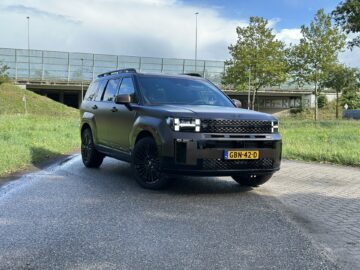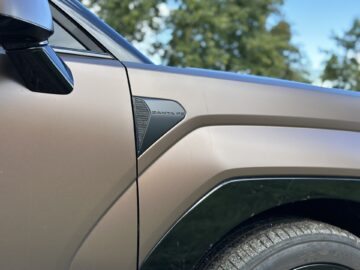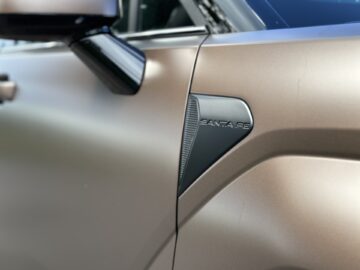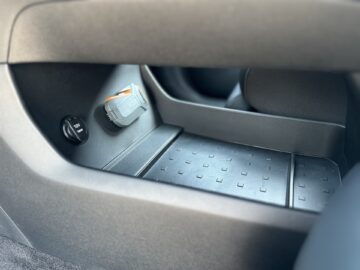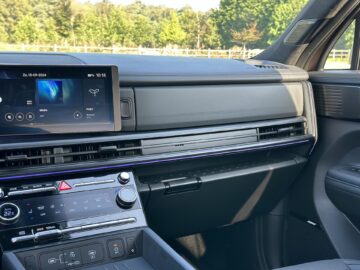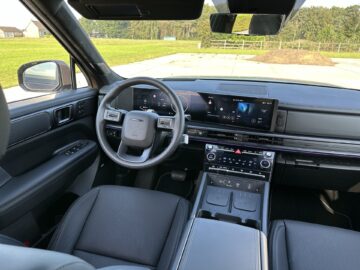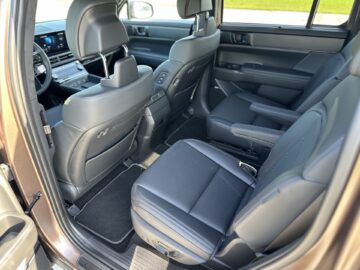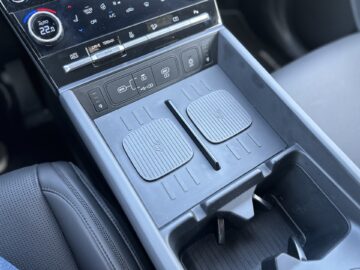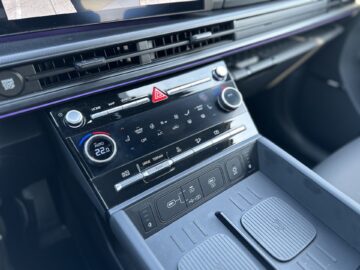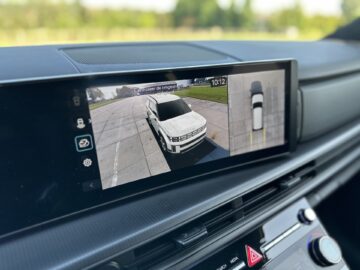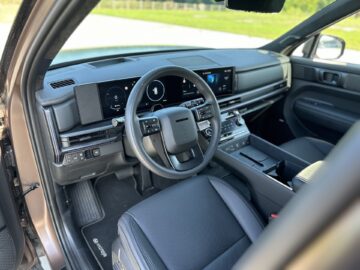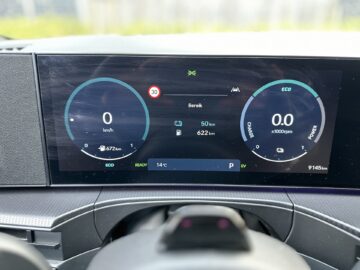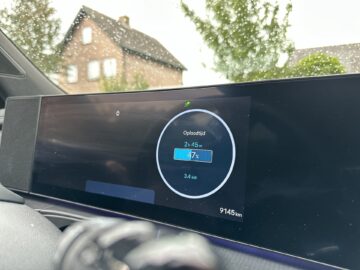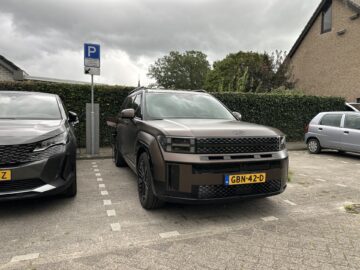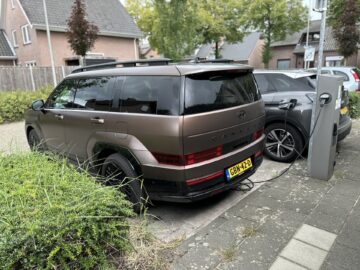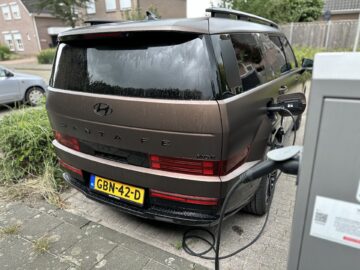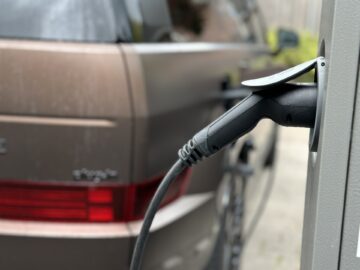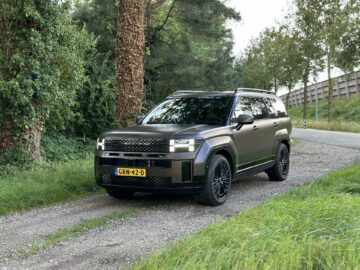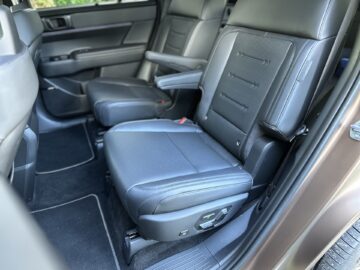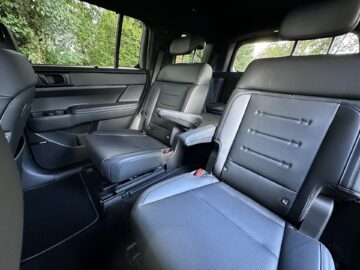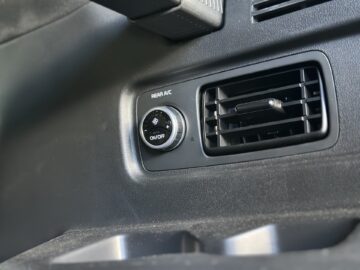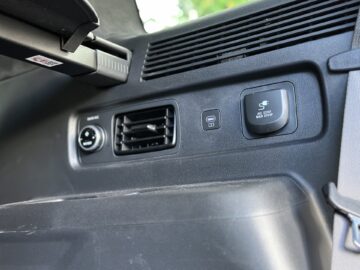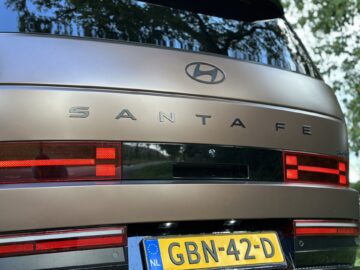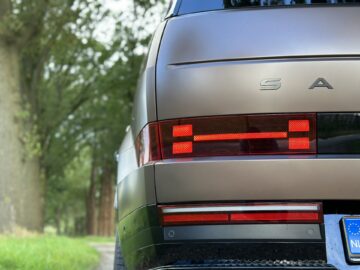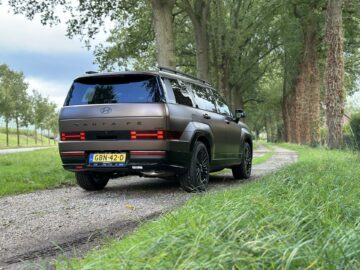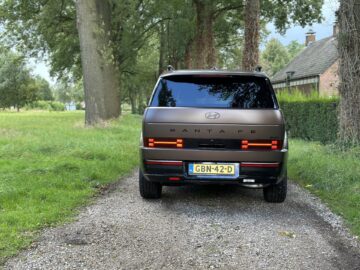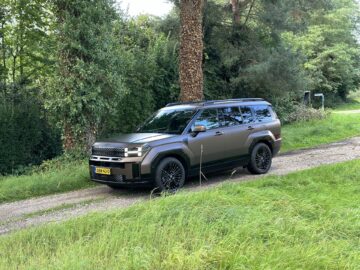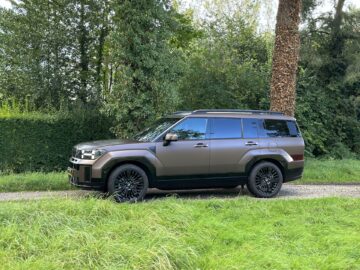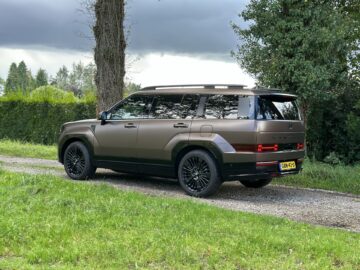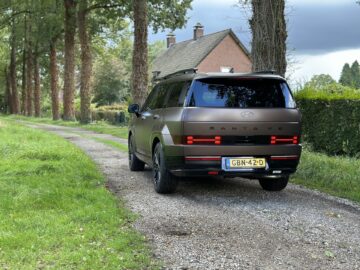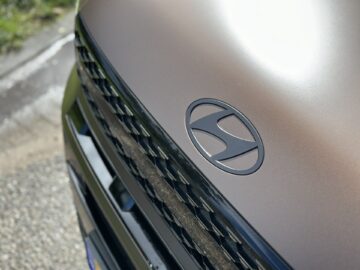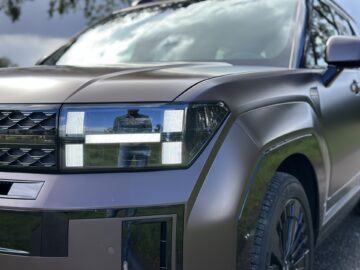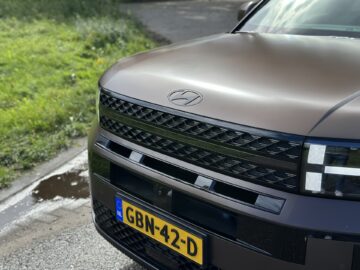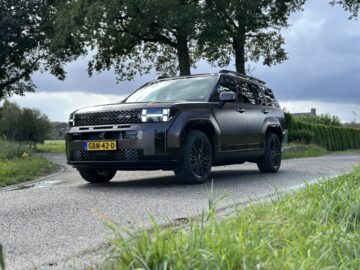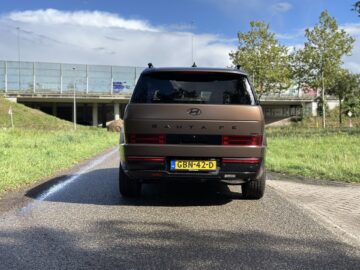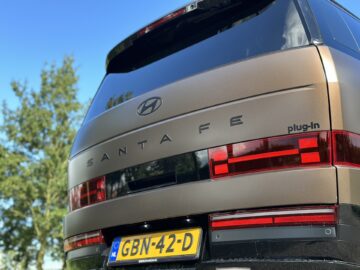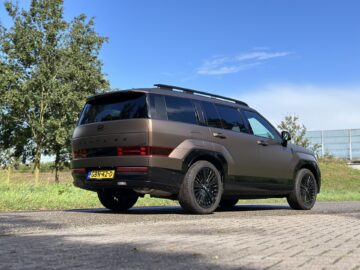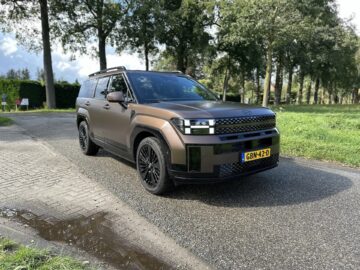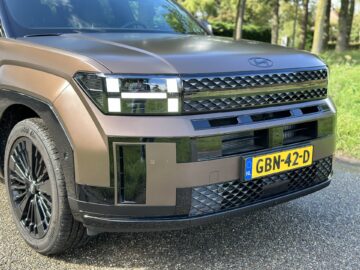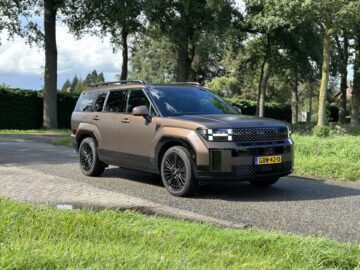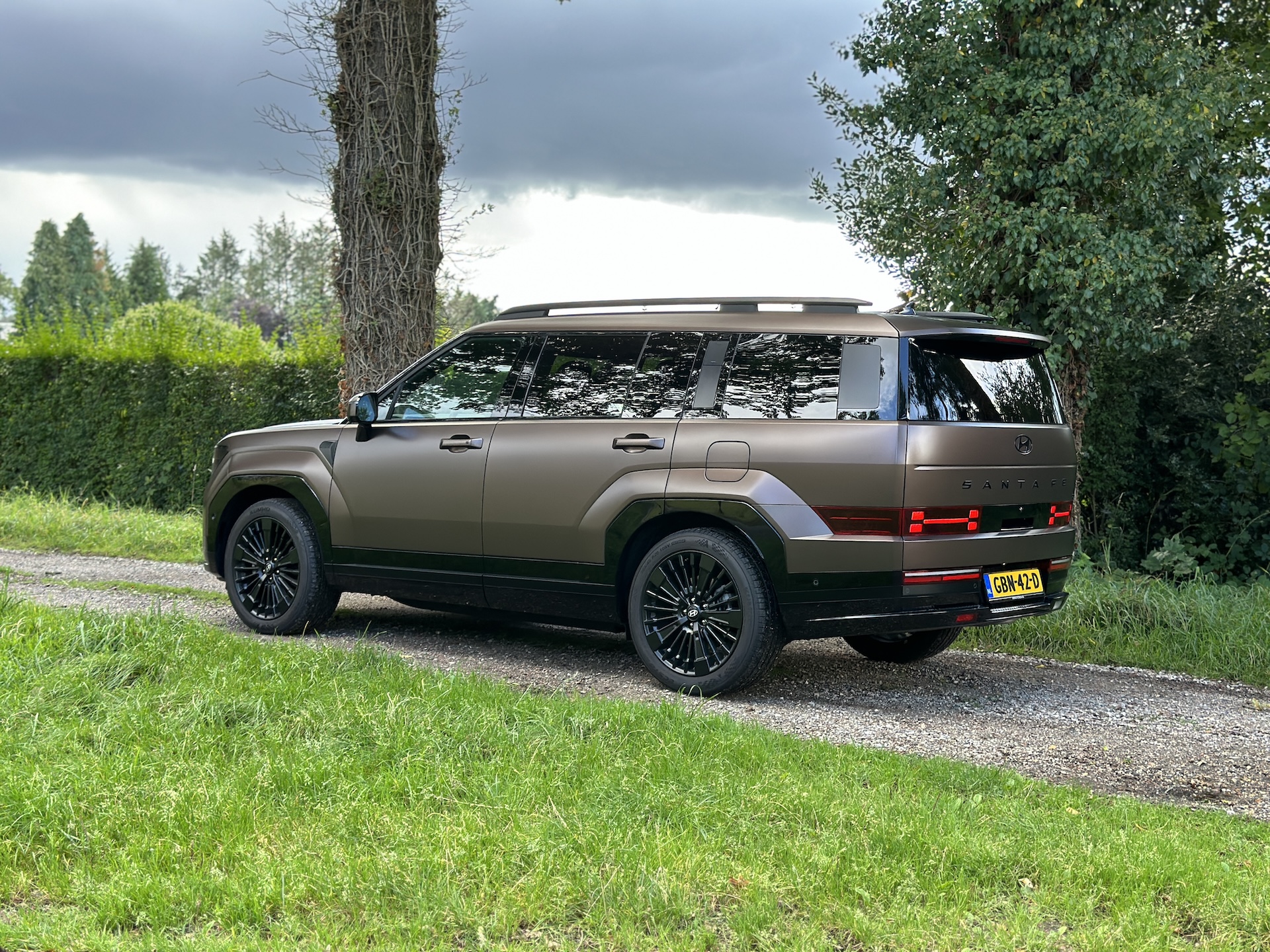Review – Hyundai Santa Fe (2024), Hyundai has balls!
Design Hyundai Santa 2024
The new Hyundai Santa Fe is radically redesigned from its predecessor. Because the interior took priority, the designers only designed the exterior after that. Hence the angular appearance. Striking are the headlights and taillight units that incorporate the letter H, a subtle reference to the Hyundai name. Featuring state-of-the-art technology, the full LED projector headlights provide long-life daylight-like illumination and automatic Smart High Beam functionality.
Tough car, that Santa Fe!
Compared to its predecessor, the new Santa Fe is also considerably larger. The wheelbase increased by 5 cm to a thick 2.81 meters. Overall length increased by 4.5 cm to 4.83 meters. The boot holds 628 liters. Folding down the backrests of the second and third rows of seats creates 1,949 liters: 300 liters more than in its predecessor. There is then also flat loading. Legroom in the second row of seats increased by 2 cm and in the third row by 3 cm. The backrests on the third row of seats can be tilted over 10 degrees.
Six or seven seats
The Hyundai Santa Fe is available with seven seats, as well as a six-seater. In the six-seat version, you take your seat in the second row of seats on luxurious electrically adjustable, independent seats with armrests. The interior looks sleek and tidy. Behind the wheel we detect a 12.3-inch instrument cluster with an equally large infotainment screen to the right with clear menu structures. The infotainment system also supports “Over-The-Air” (OTA) software updates.
UV-C Sterilization Tray
A convenient feature of this SUV is the dual wireless smartphone charging system, centrally located on the center console. A USB-C connector (up to 27W) is also included. Salient detail: the car also has a UV-C Sterilization Tray on the top of the glove compartment. This makes it easy to sterilize frequently used items, such as cell phones and wallets. You read it right: the new Hyundai Santa Fe disinfects your smartphone. In the video we show how that works. Not normal also how many cup holders this Santa Fe has, it really is a car developed with the American market in mind.
Hyundai Santa Fe Prices
Yet this Santa Fe with plug-in hybrid powertrain also feels perfectly at home on the Dutch market. This is of course due to its, on paper, very low CO2 emissions. That results in less bpm. The car in this story is a Hyundai Santa Fe 1.6 T-GDI PHEV 4WD Black Line 6-seater. Prices for the Santa Fe start at 59,595 euros, but that price applies to the seven-seat hybrid version: the 1.6 T-GDI HEV. An important difference: the six-seater comes exclusively as a Black Line and it costs 68,995 euros. The seven-seater comes as a Comfort Smart starting at 59,995 euros. So this particular one – the Black Line with six seats – costs a minimum of 68,995 euros. If you want the color Earthy Brass Mat, you have to pay an additional 1,095 euros. That brings the price to 70,090 euros.
Colors
Speaking of colors, the new Santa Fe comes with a choice of the following ten exterior colors: Terracotta Orange, Magnetic Gray Metallic, Typhoon Silver Metallic, Abyss Black Mica, Creamy White Pearl Mica, Cyber Sage Mica, Ocado Green Mica, Pebble Blue Mica, Creamy White Matte and Earthy Brass Matte. For the interior, there is a choice of black cloth upholstery or Supersonic Gray cloth or leather upholstery and Pecan Brown or Forest Green leather upholstery. The Black Line comes with black Nappa leather upholstery.
Plug-in hybrid
Back to that plug-in hybrid for a moment. Granted, you can drive some stretches 100% electric with the PHEV, but on the highway, the miles fly out of the battery pack. You’ll be lucky to get 20 to 25 kilometers on the highway in EV mode. So if you need to travel longer distances, the battery pack is pretty useless. The question then is whether you wouldn’t simply be better off choosing the hybrid Santa Fe. You get the same gasoline engine with 116 kW (158 hp) and 265 Nm, only the system power is slightly lower at 158 kw (215 hp), while you do benefit from 367 Nm of torque.
More importantly, the kerb weight reduces to 1,900 kilograms versus a minimum of 2,075 kilograms for the plug-in hybrid. That, of course, is because the lithium-ion polymer battery is missing from the hybrid. You also have a larger fuel tank: 67 liters versus 47 liters for the PHEV. Since both engine versions are virtually the same price, that hybrid seems particularly interesting overnight. The hybrid – which is slightly cheaper even with bpm – comes exclusively as a seven-seater. Accompanying the plug-in hybrid are the specifications below.
Hyundai Santa Fe Plug-in Hybrid technical data
- Number of cylinders: 4
- Engine capacity: 1,598 cc
- Gasoline engine power: 116 kW (158 hp).
- Torque gasoline engine: 265
- System power: 185 kw (252 hp)
- System torque: 367 Nm
- Battery: 13.8 kWh
- Electric driving range: 62 km WLTP, up to 50 kilometers in practice
- Transmission: six-speed automatic transmission
- Fuel consumption: 1.38 l/100 km
- Empty weight: 2,075 kg
- CO2 emissions: 38 g/km
- Third row trunk capacity folded down: 621 liters
- Trunk capacity second row folded down: 985 liters
- Length: 4,830 mm
- Width (excluding wing mirrors): 1,900 mm
- Height: 1,720 mm (with roof racks 1,770/1,780 mm)
- Wheelbase: 2,815 mm
Ah, those driver assistance systems
Driving assistance systems naturally like to make themselves heard, as in any modern Hyundai. Fortunately, everything can be quickly turned off. You can program the “favorites” button the steering wheel – in the shape of a star – to be a shortcut to the driving assistance systems. There you can quickly turn off speed alert, driver monitor and lane assist. Because those three systems in particular create a lot of distractions while driving. So every time you start up the Santa Fe, you turn off those systems – if that is desirable – for a while. Then you are free of beeps. How nice. If you do leave them on, passengers in the car start to seriously doubt your steering skills. In that respect, they have really gone overboard in Brussels with the imposition of mandatory driver assistance systems.
The Hyundai Santa Fe features the following systems:
- Forward Collision-Avoidance Assist
- Lane Following Assist
- Driver Attention Warning (DAW).
- Driver Monitoring System (DMS).
- Smart Cruise Control
- Highway Driving Assist
- Intelligent Speed Limit Assist
- Rear View Monitor
- Rear Cross-Traffic Collision-Avoidance Assist
- Front/Rear Parking Distance Warning
- Surround View Monitor
- Remote Smart Parking Assist
- Safe Exit Assist
Hyundai Santa Fe equipment
As standard, the Hyundai Santa Fe is already quite richly equipped, including 18-inch alloy wheels with 235/60 R18 tires, LED daytime running lights and a 12.3-inch multimedia screen with navigation, DAB+, Bluelink and Apple CarPlay/Android Auto. Other features and infotainment and safety systems include:
- Rear spoiler with integrated LED third brake light
- Electric folding exterior mirrors
- Light tinted windows, front and rear
- Rear view camera with dynamic auxiliary lines
- Cruise control with Stop & Go function
- Bluetooth with voice recognition
- Wireless charging capability (phone)
- USB-C connector in front seats (second row of seats)
- Switch paddles for regenerative braking system
- Heated front seats
- Heated steering wheel
- Third row of seats fold down in parts (50:50)
- ABS, ESC, Inclination Assist, Multi Collision Brake System
- Emergency Brake Assist (FCA 1.5) with pedestrian and cyclist recognition
- ‘Over-The-Air’ (OTA) software updates
Conclusion review Hyundai Santa Fe
The new Santa Fe is still that practical family SUV, but now with the look that fits the Indiana Jones movie. As far as we’re concerned, that’s a strong feature, because in a market flooded with SUVs and crossovers, you have to do something to stand out. Hyundai has had the balls to make the Santa Fe something special. It is extremely comfortable, extremely spacious, and those who faithfully hang the car on the charging pole are also quite economical. Rather not plug in? Then just go for the hybrid.
